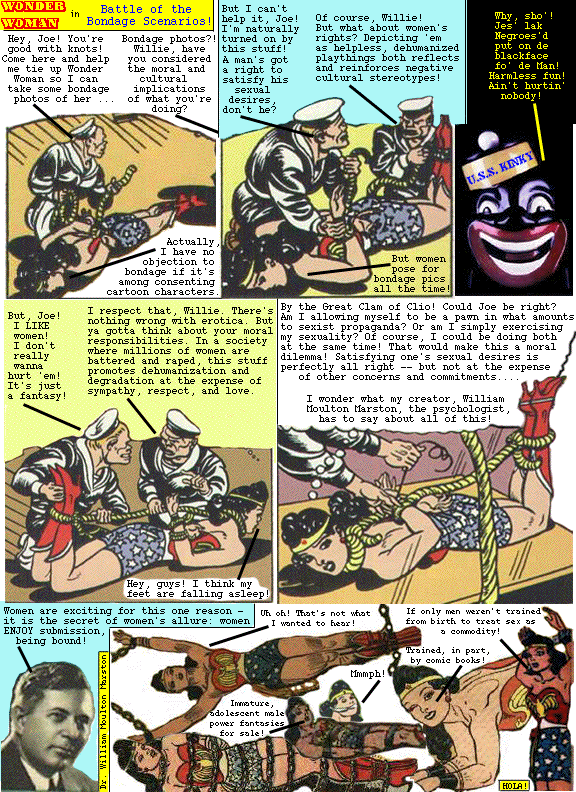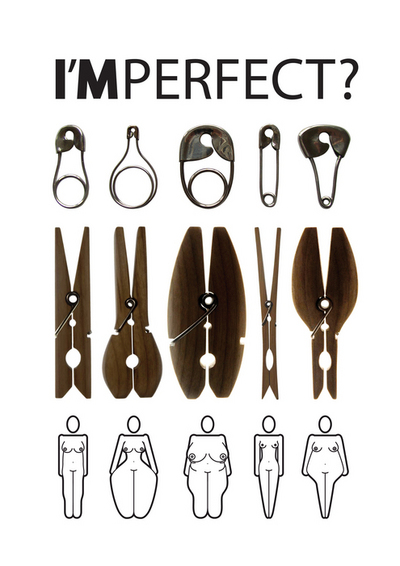The way that Jessica Alba uses her will (she goes after what she wants) to pursue make-up, of all things, reminds me of these, these, this, and these examples of the commodification of feminism.
gender: feminism/activism
Susanne T. sent us this image of an ad at a busy stop at the University of Bremen, Germany (comments after the image). Susanne translates the ad to read:
Kids are only well when mothers are well. Her project ‘wellcome’ helps families to order the everyday chaos. Strong women, strong country.

Feminist theorists note that there are two ways to integrate women into a society as equals to men: as citizen-workers (who perform the same tasks as men, namely breadwinning) or as citizen-mothers (who perform different tasks than men, namely parenting). If, and this is a big if, we truly valued parenting as much as we valued breadwinning, then the latter is a perfectly viable strategy with which to bring about a gender egalitarian society.
In the U.S., we conflate the idea of equality with gender sameness, assuming that any difference between men and women is a sign of oppression. So, to many Americans, the fact that this ad makes fathers invisible and holds women alone responsible for parenting is problematic (as Susanne noted). But different isn’t necessarily unequal and Germany (as well as France) has a tradition of supporting women as mothers. By “supporting” I mean generous social policy that rewards women in concrete ways for reproducing the nation.
I’m not sure to what extent Germany still supports mothers with pro-natal policies. Susanne’s critique may very well be more accurate than my comments about different ways of integrating women into the state. However, I think it’s useful to problematize our assumptions about what equality would look like. If women were truly valued for their unique contributions, that would be okay. The problem in the U.S. is that we hold women responsible for childcare and also devalue that work.
Adding freedom to that equality, of course, means state support for both citizen-workers and citizen-parents (of both sexes) and equally valuing both contributions.
Also see this post on equating motherhood and military service in the Third Reich.
Ads often connect buying products with giving women freedom and independence. For instance, of course we knew we’d come a long way, baby, once we got our own cigarettes:
The Chase Freedom credit card gives you the liberty to spend money on all kinds of things:
All of these ads use the theme of women’s independence and freedom as something to be purchased. Women don’t get more freedom by struggling for it, and there aren’t any real obstacles; these companies have commodified independence for you, so all you have to do is buy their product and you’re set!
See also here, here, here, here, here, here, here, and here.
Found at The Situationist.
Gwen Sharp is an associate professor of sociology at Nevada State College. You can follow her on Twitter at @gwensharpnv.
Brook M. brought our attention to Al Jazeera’s English-language coverage of Arab women athletes training for the 2008 Olympics. They include a Moroccan runner, Israeli Arab boxers, a Qatar race-car driver, and Egyptian soccer players. Among other topics, the segments address opposition the women have faced being female Arab Muslims in sports, especially concerning their clothing. The first segment is about 11 minutes long; the second one is about 12 and a half.
One thing I like about these videos is they show the diversity of Arab Muslim women, a group often depicted as a homogeneous, passive, subordinate group all wearing veils. Some of the women in the clips do not cover their hair while some wear hijab. Among those who wear hijab, some cover every bit of their hair, others do not; some head scarves are lace and fairly transparent, while others are dark and solid. The women talk about how they feel about mixing religion and sports and being female athletes, and again, they differ in their perspectives.
While the sports element is interesting, seeing the diversity among Arab women, as well as Arab women actively discussing religion and resisting gender roles, may be very useful for students who usually encounter portrayals of Arab women as completely oppressed victims of a sexist culture/religion, so I can imagine using it in classes that aren’t about sports.
Thanks, Brook M.!
Daniel F. (who has a blog here) sent us this Temptation cookie ad from Mexico, which plays on the idea that men fear independent, strong women:
Daniel’s translation:
Host: Gentlemen, what we feared has happened. You have the new Mexican woman; she is more independent and gives more importance to what she wants.
First man: But, does she cool our beers?
Host: No, never again. And that’s not all. She also wants us to take our children to the pediatrician.
Second man: What’s that?
Host: Pediatrician is the doctor for kids.
Second man: No, the other thing, “children.”
Host: Children are the little people who call us dad.
Third man: And what is that she has in her hand?
Host: This, my friends, is the new Temptation cookie, because the new Mexican woman has her pleasures without guilt and, what’s worse, she doesn’t share.
Woman: Gentlemen, I’m leaving. I have things to do.
Narrator: There’s a new woman and she has new cookies.
The ad also connects sex and food and, in fact, replaces sexual pleasure (and men) with food, a theme Jean Kilbourne mentions in “Killing Us Softly 3”–that women are encouraged to use food to replace sex or console themselves when they have romantic troubles.
It’s also interesting that the ad plays on the idea of old-fashioned Mexican men who expect women to serve them.
Thanks, Daniel!
What is the relationship between the denigration of men as men and patriarchy? So long as we buy into the idea that we can’t expect men to be good partners or fathers, we will tolerate women’s responsibility for the second shift and their placement on the mommy track at work. So the Homer Simpson-esque sitcom dads and the Jackass teenagers, while incredibly degrading to men, also serve to perpetuate patriarchy.
Case in point:
Jessica at Feministing writes that this ad:
…feed[s] into the sexist idea that men deserve a cookie for being halfway decent human beings, but it also denigrates men by suggesting that they’re animals, unable to resist any ass that that happens to pass their way.
Another excellent example here.
By Leonie Martine Janssen (from Miguel via Inspire Me, Now!):
This satirical cartoon about Wonder Woman, found here, might be an interesting conversation-starter about power and sexuality, and how we’re always expressing our own sexuality within a set of social assumptions about gender, power, and so on.

Thanks, Krystal-Lynn M.!
NEW! Here is a Wonder Woman comic (found here) that depicts her using her sexuality as a weapon. Thanks to Potts for sending this one along!
Susanne T. sent us this image of an ad at a busy stop at the University of Bremen, Germany (comments after the image). Susanne translates the ad to read:
Kids are only well when mothers are well. Her project ‘wellcome’ helps families to order the everyday chaos. Strong women, strong country.

Feminist theorists note that there are two ways to integrate women into a society as equals to men: as citizen-workers (who perform the same tasks as men, namely breadwinning) or as citizen-mothers (who perform different tasks than men, namely parenting). If, and this is a big if, we truly valued parenting as much as we valued breadwinning, then the latter is a perfectly viable strategy with which to bring about a gender egalitarian society.
In the U.S., we conflate the idea of equality with gender sameness, assuming that any difference between men and women is a sign of oppression. So, to many Americans, the fact that this ad makes fathers invisible and holds women alone responsible for parenting is problematic (as Susanne noted). But different isn’t necessarily unequal and Germany (as well as France) has a tradition of supporting women as mothers. By “supporting” I mean generous social policy that rewards women in concrete ways for reproducing the nation.
I’m not sure to what extent Germany still supports mothers with pro-natal policies. Susanne’s critique may very well be more accurate than my comments about different ways of integrating women into the state. However, I think it’s useful to problematize our assumptions about what equality would look like. If women were truly valued for their unique contributions, that would be okay. The problem in the U.S. is that we hold women responsible for childcare and also devalue that work.
Adding freedom to that equality, of course, means state support for both citizen-workers and citizen-parents (of both sexes) and equally valuing both contributions.
Also see this post on equating motherhood and military service in the Third Reich.
Ads often connect buying products with giving women freedom and independence. For instance, of course we knew we’d come a long way, baby, once we got our own cigarettes:
The Chase Freedom credit card gives you the liberty to spend money on all kinds of things:
All of these ads use the theme of women’s independence and freedom as something to be purchased. Women don’t get more freedom by struggling for it, and there aren’t any real obstacles; these companies have commodified independence for you, so all you have to do is buy their product and you’re set!
See also here, here, here, here, here, here, here, and here.
Found at The Situationist.
Gwen Sharp is an associate professor of sociology at Nevada State College. You can follow her on Twitter at @gwensharpnv.
Brook M. brought our attention to Al Jazeera’s English-language coverage of Arab women athletes training for the 2008 Olympics. They include a Moroccan runner, Israeli Arab boxers, a Qatar race-car driver, and Egyptian soccer players. Among other topics, the segments address opposition the women have faced being female Arab Muslims in sports, especially concerning their clothing. The first segment is about 11 minutes long; the second one is about 12 and a half.
One thing I like about these videos is they show the diversity of Arab Muslim women, a group often depicted as a homogeneous, passive, subordinate group all wearing veils. Some of the women in the clips do not cover their hair while some wear hijab. Among those who wear hijab, some cover every bit of their hair, others do not; some head scarves are lace and fairly transparent, while others are dark and solid. The women talk about how they feel about mixing religion and sports and being female athletes, and again, they differ in their perspectives.
While the sports element is interesting, seeing the diversity among Arab women, as well as Arab women actively discussing religion and resisting gender roles, may be very useful for students who usually encounter portrayals of Arab women as completely oppressed victims of a sexist culture/religion, so I can imagine using it in classes that aren’t about sports.
Thanks, Brook M.!
Daniel F. (who has a blog here) sent us this Temptation cookie ad from Mexico, which plays on the idea that men fear independent, strong women:
Daniel’s translation:
Host: Gentlemen, what we feared has happened. You have the new Mexican woman; she is more independent and gives more importance to what she wants.
First man: But, does she cool our beers?
Host: No, never again. And that’s not all. She also wants us to take our children to the pediatrician.
Second man: What’s that?
Host: Pediatrician is the doctor for kids.
Second man: No, the other thing, “children.”
Host: Children are the little people who call us dad.
Third man: And what is that she has in her hand?
Host: This, my friends, is the new Temptation cookie, because the new Mexican woman has her pleasures without guilt and, what’s worse, she doesn’t share.
Woman: Gentlemen, I’m leaving. I have things to do.
Narrator: There’s a new woman and she has new cookies.
The ad also connects sex and food and, in fact, replaces sexual pleasure (and men) with food, a theme Jean Kilbourne mentions in “Killing Us Softly 3”–that women are encouraged to use food to replace sex or console themselves when they have romantic troubles.
It’s also interesting that the ad plays on the idea of old-fashioned Mexican men who expect women to serve them.
Thanks, Daniel!
What is the relationship between the denigration of men as men and patriarchy? So long as we buy into the idea that we can’t expect men to be good partners or fathers, we will tolerate women’s responsibility for the second shift and their placement on the mommy track at work. So the Homer Simpson-esque sitcom dads and the Jackass teenagers, while incredibly degrading to men, also serve to perpetuate patriarchy.
Case in point:
Jessica at Feministing writes that this ad:
…feed[s] into the sexist idea that men deserve a cookie for being halfway decent human beings, but it also denigrates men by suggesting that they’re animals, unable to resist any ass that that happens to pass their way.
Another excellent example here.
By Leonie Martine Janssen (from Miguel via Inspire Me, Now!):
This satirical cartoon about Wonder Woman, found here, might be an interesting conversation-starter about power and sexuality, and how we’re always expressing our own sexuality within a set of social assumptions about gender, power, and so on.

Thanks, Krystal-Lynn M.!
NEW! Here is a Wonder Woman comic (found here) that depicts her using her sexuality as a weapon. Thanks to Potts for sending this one along!


